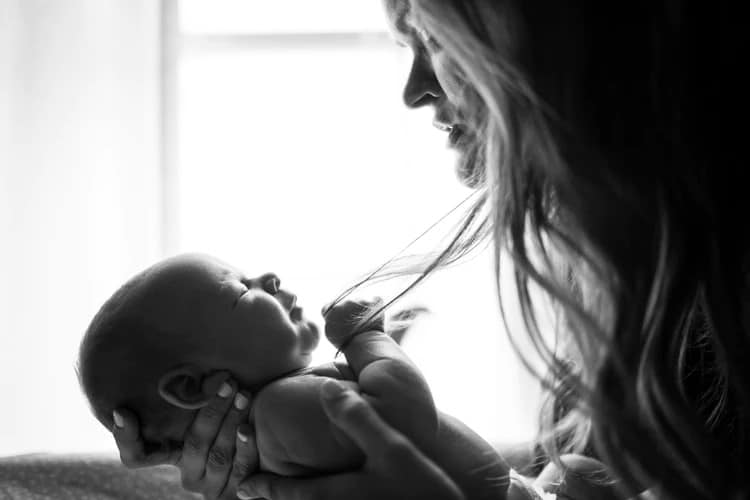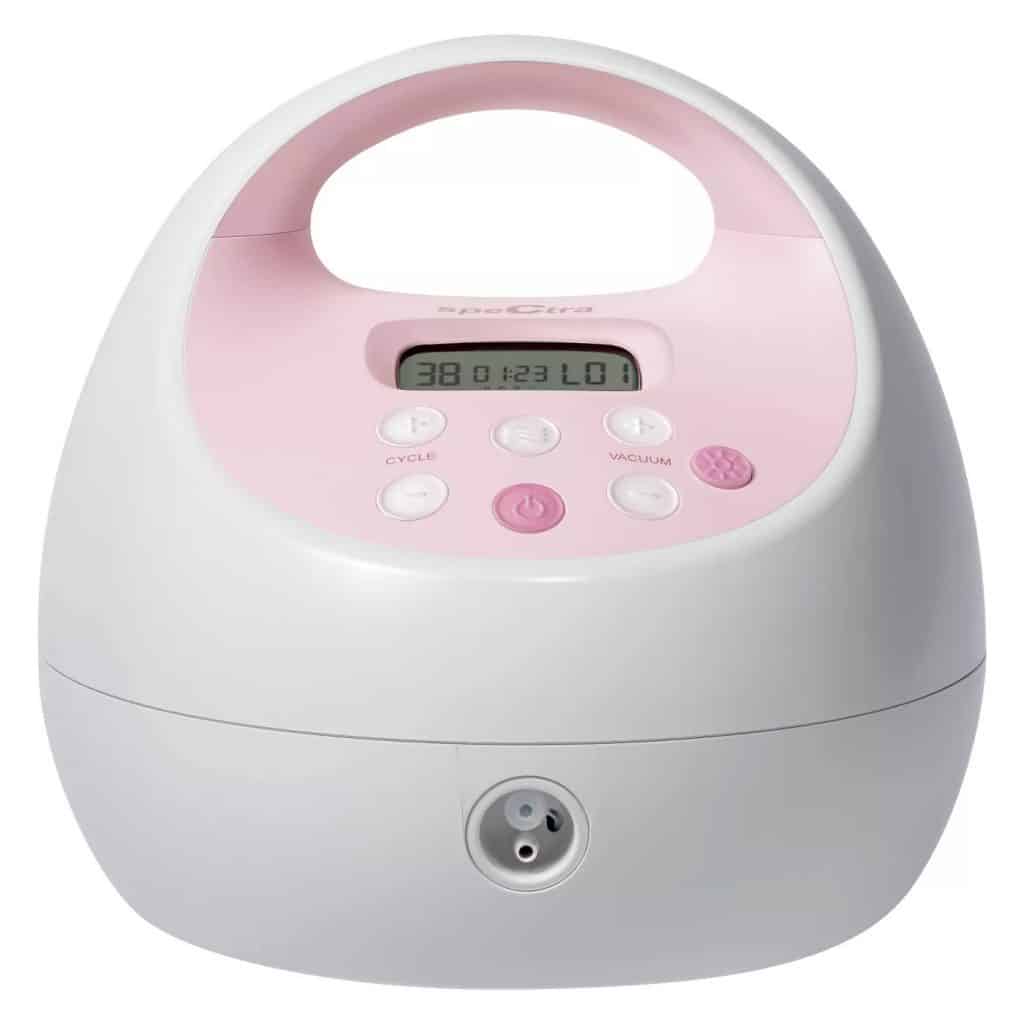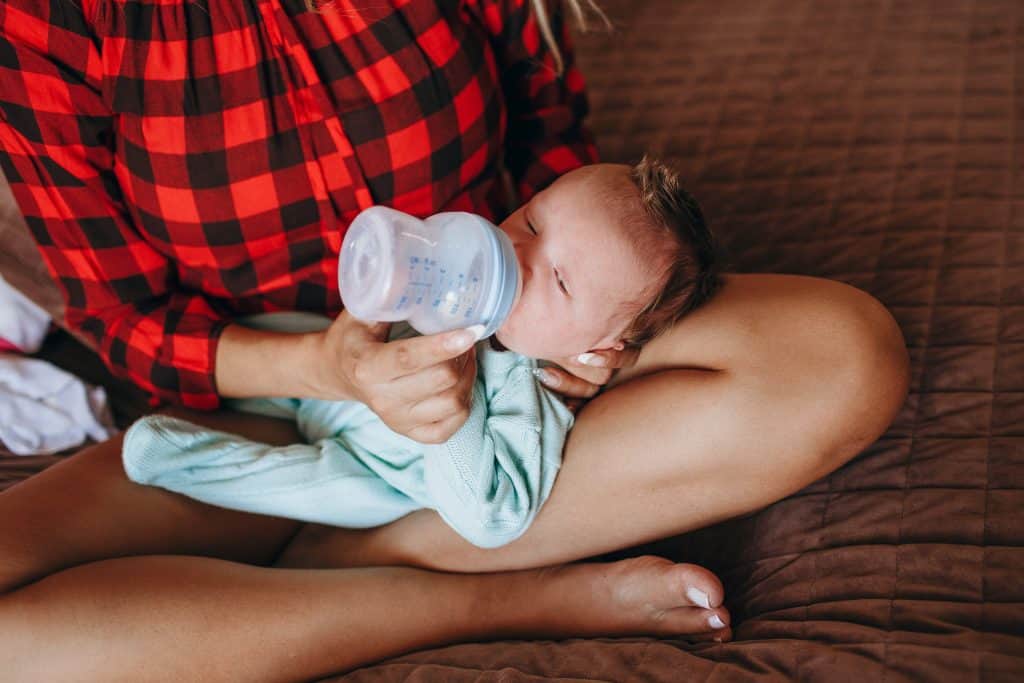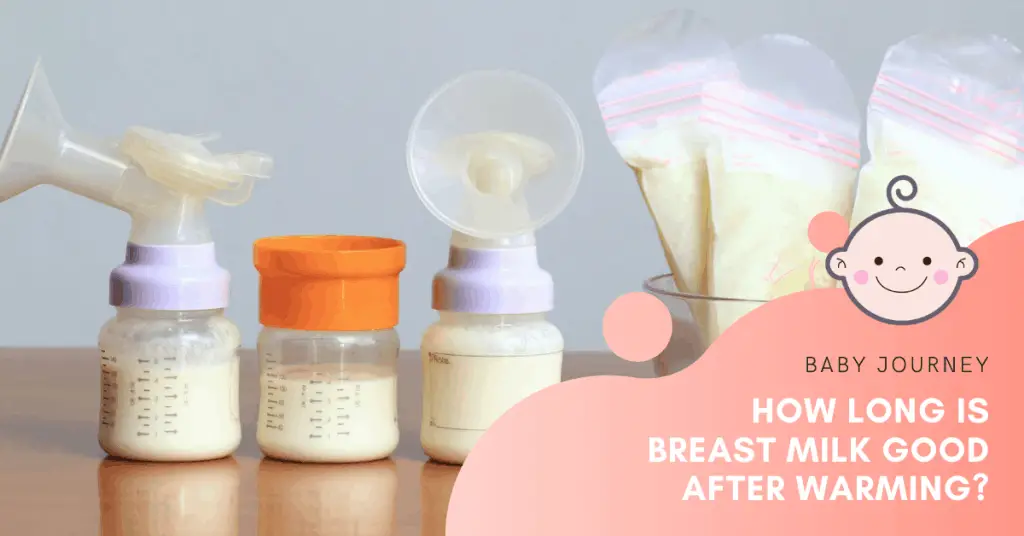Nursing mothers are susceptible to illness, but having a cold while breastfeeding can be worrisome.
Is it okay to continue breastfeeding while sick? If a breastfeeding mom is sick, could she pass the illness to her baby? What about breastfeeding an unwell baby?
Our helpful guide will cover everything you need to know about nursing while ill, whether you or your baby is the one sick with the cold.
You may be interested in: How to Make Breastmilk Fattier?
- Safety Concerns on Breastfeeding While Sick
- What Diseases Can Be Passed Through Breast Milk?
- Breastfeeding While Mom/Baby Is Sick
- Breastfeeding With a Cold or Flu?
- Breastfeeding With a Fever
- Breastfeeding With a Cough
- Breastfeeding With a Sore Throat
- Breastfeeding if Mom Has Diarrhea or Food Poisoning
- Breastfeeding With Mastitis
- Breastfeeding if Baby Has an Ear Infection
- Nursing if Breastfeeding Mom Is Sick With Coronavirus (COVID-19)
- Should I Give My Baby Water Instead of Breast Milk When They Are Sick?
- Can Being Sick Affect Breast Milk Supply?
- 7 Tips to Protect Your Baby When Breastfeeding Ill
- Safe Remedies for Sick Nursing Moms
- Other Tips & Precautions
- Don’t Stop Nursing!
Safety Concerns on Breastfeeding While Sick
In general, if you or your baby are sick with a cold or the flu, it is okay to continue breastfeeding.
As a matter of fact, the antibacterial and antiviral elements found in breastmilk offer your baby a potent dose of protective antibodies each time they feed.
However, there are certain situations in which breastfeeding may not be advised. Keep reading to find out more!
Further reading: Breastfeeding VS. Pumping

Is It Safe to Breastfeed When the Mother Is Sick?
If a nursing mom is ill with a common cold, stuffy nose, or even the flu, she can likely still breastfeed. Though the mom may not feel up to breastfeeding, doing so may help to protect the baby as well as providing valuable nourishment.
Unfortunately, breastfeeding moms don’t get sick days and in most cases, the CDC even recommends continuing to breastfeed. [1]
Is It Safe To Breastfeed When the Baby Is Sick?
If your baby is sick with a common cold or the flu, breastfeeding can be very beneficial for them. Therefore, it is generally advised that the sick child continue being breastfed.
Breastfeeding a baby with cold isn’t always easy, as congestion and a sore throat can make it difficult. However, breastfeeding when baby is sick helps to keep them topped up on hydration and nutrition.
Continuing to breastfeed a sick newborn is very important, as breast milk is their only form of both food and liquids. However, whenever a small baby becomes ill you should contact your child’s doctor as soon as possible.
Breastfeeding a sick infant remains to be important as they rely on breast milk throughout their first year of life. If you are ever concerned about your baby’s health and breastfeeding, reach out to their pediatrician.
The good news is that if you practice good hygiene, the cold or medical condition typically won’t be passed from the queasy baby to the healthy caregiver. In fact, when a sick mom nurses a healthy baby she passes antibodies to her child that can help strengthen his or her immune system.
Related: How to Produce More Breastmilk?
What Diseases Can Be Passed Through Breast Milk?
Sometimes, breastfeeding is not recommended to continue when the mother is sick. What diseases can be passed through breast milk? The APA and CDC recommend abstaining from breastfeeding if the mother has HIV or untreated Tuberculosis. [2]
Hepatitis B has been detected in breast milk, however, if the baby is vaccinated against the disease breastfeeding can usually continue.
Most babies are vaccinated immediately after being born and those with mothers positive for Hep B also receive the hepatitis B immune globulin.
Hepatitis C is also considered breastfeeding compatible. However, an infant can be infected in both pregnancy or delivery. Fortunately, breastfeeding may help to protect the baby from hepatitis C as antibodies are transferred from the mother.
Cancer is another complication that can interfere with breastfeeding. While cancer itself doesn’t mean you can’t breastfeed, treatment for the disease does.
It is advised that mothers receiving chemotherapy stop breastfeeding because the drugs transfer to the nursing infant in high and risky amounts. [3]
Other diseases not compatible with breastfeeding according to the CDC include: [4]
- T-cell lymphotropic virus type I or type II
- Ebola
- Untreated brucellosis
- Active herpes simplex virus (HSV) on the breast
- Active varicella (chickenpox)
Breastfeeding While Mom/Baby Is Sick
Breastfeeding With a Cold or Flu?
If the mother is sick for a few days with the common cold or the flu, she can usually continue to breastfeed. She will want to stay hydrated and rest as much as possible, as well as keep up with her nutrition when.
Practicing good hygiene, like washing hands and not breathing on the baby can help protect the infant.
The question, what can I take for a cold while breastfeeding is extremely valid. Be sure to run all medications by your doctor, your child’s pediatrician, and/or a pharmacist before taking anything while breastfeeding.
If the baby has a cold or the flu and has been seen by a doctor, breastfeeding is a good choice. The baby may want to nurse more often for comfort, or they may be reluctant to nurse because of sore throat, ear pain, or congestion.
Keeping the baby upright while nursing can help, as can using saline with suction on nasal passages, running a vaporizer, and nursing as frequently as possible. [5]

Breastfeeding With a Fever
You may wonder, can I still breastfeed if I have a fever? For the mother, nursing with a fever is generally okay. It is important to know the cause of the fever though so that the mother can be sure she won’t pass anything on to her child.
Staying hydrated is very important when breastfeeding with a fever. The mother also wants to be sure to rest and keep up with her nutrition.
If the mom decides to take over the counter medication to bring down her fever, she should check with her healthcare provider and lactation consultant about any contraindications with breastfeeding.
If your baby has a fever, it is important to have them seen by a doctor. If your baby is under three months and has a fever, it is considered an emergency. [6]
Caregivers are encouraged to nurse little ones as often as possible to keep them hydrated when the doctor has cleared them for feeding from breast.
Breastfeeding With a Cough
If the mother has a cough, she can usually continue to breastfeed but should take care not to cough on her child. Washing your hands and sneezing into a tissue can help prevent the spread of germs.
Most throat lozenges are okay, but not all decongestants are breastfeeding approved. Running a humidifier is a non-invasive way to relieve your cough.
Breastfeeding a coughing baby can be a little intimidating, as your child may pull off the breast and start sputtering and fussing.
Using a vaporizer or humidifier can help your little ones cough. Keeping your baby upright may make it easier for them to nurse.
Breastfeeding With a Sore Throat
A sore throat is another common symptom of a cold and usually doesn’t mean you have to stop breastfeeding temporarily. Moms can use some throat sprays or lozenges, but be sure to check with your doctor.
Practice good hygiene when you are around your baby, and try to stay topped up on liquids if you have a sore throat while breastfeeding.
A baby with a sore throat may not want to nurse as much, but offering the breast frequently is good practice.
If your baby is old enough you can even offer them a breast milk popsicle, homemade with your milk, to help soothe their throat.
Breastfeeding if Mom Has Diarrhea or Food Poisoning
Breastfeeding with diarrhea, upset stomach, or food poisoning is usually okay.
You should take great care not to spread any germs to your baby by washing your hands, trying not to breathe into their face, and not letting them come into contact with contaminated clothes or blankets.
When you are sick with a stomach ailment it’s very important to stay hydrated, both for your health and your milk supply.
Be sure to check all anti-diarrheal or anti-nausea medications with your doctor or pharmacist.
Related: Foods to Avoid While Breastfeeding
Breastfeeding With Mastitis
Breastfeeding with mastitis may actually help get rid of the infection. [7] However, the mother needs to take care to rest and hydrate to help her body heal.
Placing a wet and warm washcloth over the infected area before breastfeeding and massaging while breastfeeding can help the milk flow more freely.
Feeding directly from the infected breast is okay, but if it is too painful offer this breast second or pump either with an electric or manual breast pump.

Breastfeeding if Baby Has an Ear Infection
An ear infection can make a baby hesitant to breastfeed, often because swallowing can be painful. The same can also happen if your child has stomach bug. Still, breastfeeding should be encouraged.
Try to nurse your little one as often as they will accept the breast. If (old enough) your baby continues to develop a hard time feeding directly from the breast, you can also ask their doctor for pain relief medications.
Nursing if Breastfeeding Mom Is Sick With Coronavirus (COVID-19)
The novel coronavirus (COVID-19) is still being studied in relation to breastfeeding, however, early research from World Health Organization (WHO) shows that it is okay to nurse while sick with coronavirus.
Nevertheless, the mother should take precautions like wearing a mask while nursing, washing her hands, and cleaning all surfaces that the baby will come into close contact with, including her skin. [8]
In most situations, nursing while sick is generally okay. There may be some instances in which a mom is receiving treatment, on long-term medication, or is in the hospital and nursing isn’t possible or recommended.
Your doctor should advise you as to which medications and common illness aren’t safe to breastfeed with. If you have to be away from your baby but are still allowed to nurse, pumping milk is a good alternative.
You may be interested in: How to Choose a Breast Pump
Should I Give My Baby Water Instead of Breast Milk When They Are Sick?
Nursing is usually encouraged when the mother is sick, or when the baby is sick due to breastfeeding antibodies.
Breast milk changes when baby is sick and the antibodies created by the mother are passed to the nursing infant. They can help strengthen an infant’s immune factors, system and prevent illness.
Water doesn’t possess these same qualities. Water also isn’t recommended for breastfed babies under six months. Breast milk is plenty hydrating and nourishing.
You shouldn’t give your baby water unless advised by a doctor.

Can Being Sick Affect Breast Milk Supply?
Unfortunately, being sick can affect and decrease milk supply. This is because it can be harder to stay hydrated, especially with fevers, vomiting, or diarrhea.
You may also want to nurse less when you don’t feel well, which can drop your supply levels. Your body is working hard on breast milk production and illness combatting.
Be sure to rest, hydrate, and eat nutrient-dense foods as much as possible.
Fortunately, breast milk changes when you are sick to boost your baby’s immune system.
The antibodies in your breast milk will provide some protection to your infant, helping them to fight off whatever cold flu you have.
7 Tips to Protect Your Baby When Breastfeeding Ill
When you are sick practice the following hygiene protocols to help prevent spreading your illness to your baby.
- Wash your hands before touching your baby
- Don’t cough or sneeze into your shirt or sleeve which your baby may touch
- Cough or sneeze into a tissue, throw it away promptly, and wash your hands
- Don’t share food/drinks/or other items with your baby
- Sanitize and disinfect anything your baby will come into contact with, including your skin
- Don’t cough, sneeze, or breath directly onto your baby
- If necessary, wear a mask when nursing your baby

Safe Remedies for Sick Nursing Moms
There are many medications that can be used for illnesses, colds, and the flu. It is very important to check all medications with your doctor or pharmacist.
In general, these over the counter medications are approved for expressed breast milk feeding:
Approved for Breastfeeding
- Pseudoephedrine
- Acetaminophen
- Guaifenesin
- Dextromethorphan
- Chlorpheniramine
- Ibuprofen
- Most lozenges and throat sprays (but menthol can decrease milk supply)
Some of these medications can affect your supply, they may also make young children irritable. It is better to take a medication that treats your specific symptom(s) rather than a broad-spectrum medication.
Not Approved for Breastfeeding
In general, you should avoid medications containing:
- High povidone-iodine content
- High alcohol content
- A high content of drowsiness inducing ingredients (like Benadryl or “night time” medications)
Other Tips & Precautions
Maintaining your health and your breast milk supply is no easy task. Follow these tips to get well and keep up your supply.
- Drink plenty and enough fluids or water to stay hydrated
- Eat a balanced diet full of nutrient-rich foods
- Get enough rest. Ask someone else to take good care of your baby and household tasks
- Talk to your healthcare provider and lactation consultant about your symptoms and possible medications
- Pump to prevent breast engorgement if your baby won’t nurse, or you cannot nurse them safely
Related: A Complete Guide to Getting the Best Breast Pump
Don’t Stop Nursing!
Most experts say yes when asked, is it ok to breastfeed your baby while sick with a routine illness. It can have advantages for your baby, like keeping them nourished and providing them with antibodies.
You may worry – “Can a baby catch a cold from breastfeeding?” – but this isn’t usually the case if you practice good hygiene. Breastfeeding while feeling under the weather also helps to maintain your supply.
In any event you aren’t able to nurse your child directly, rest assured to use a breast pump to help you instead.
Hopefully, this provided you with plenty of information about the topic. Feel free to ask any questions in the comments!
—




